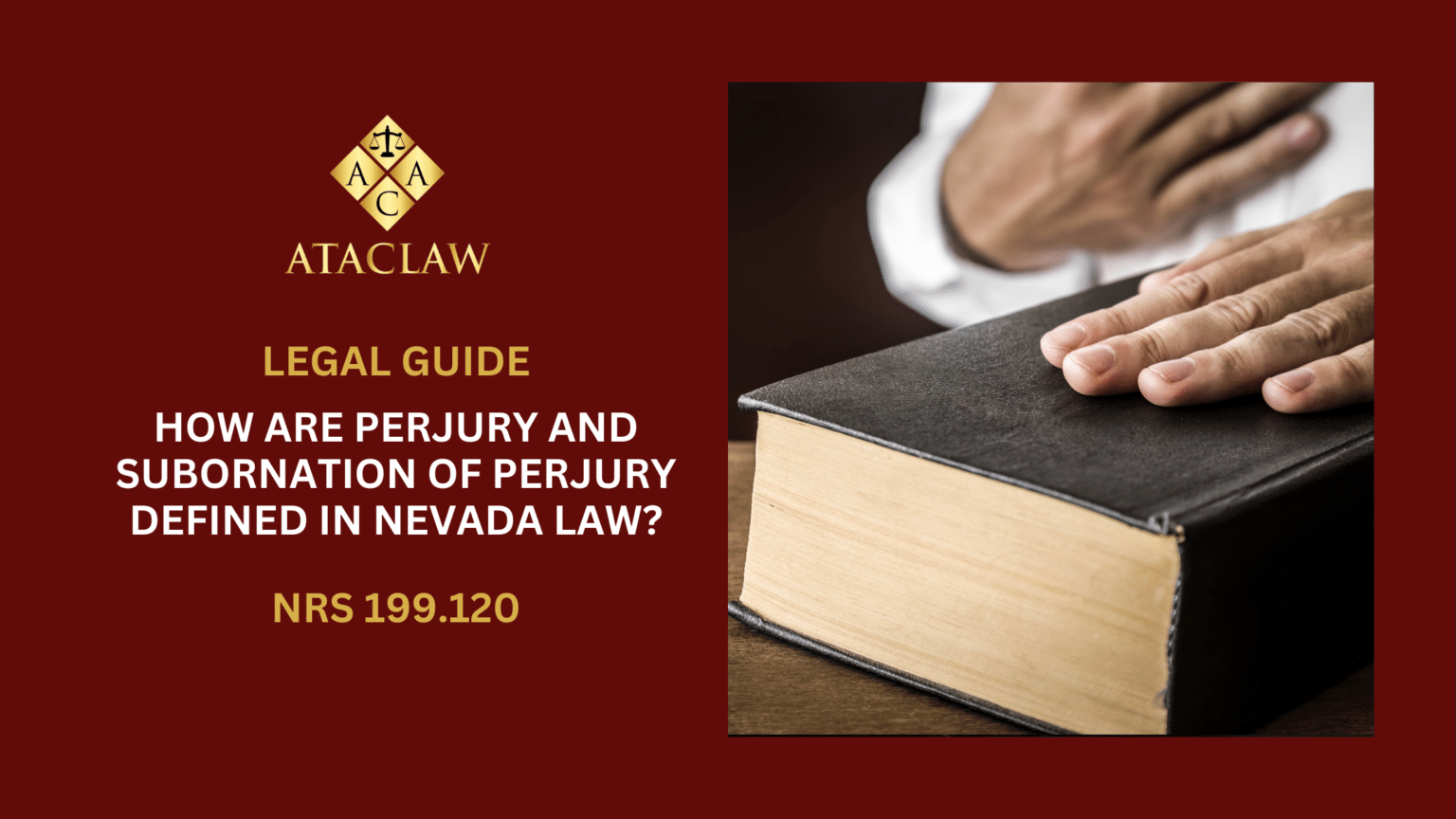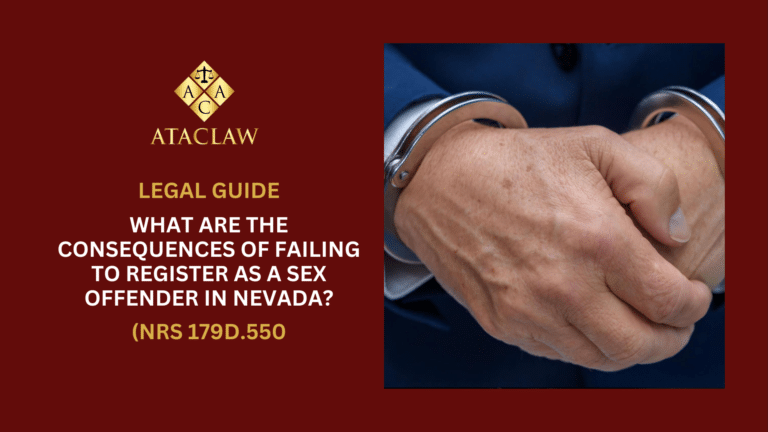In Nevada, there are serious laws and punishments set for cases where someone lies under oath. Imagine court as a place of truth, and when this truth is tampered with, it can create false justice. This act of intentionally lying is called perjury. There’s another term known as subornation of perjury, which means convincing someone else to lie under oath.
Both of these acts are pretty severe offenses in Nevada’s eyes. In legal language, they are called ‘category D felonies.’ Think of this as a really strict grading system for crimes, where ‘D’ is a serious grade. If found guilty, you could be placed in prison for anywhere between 1 to 4 years. On top of that, you could also be given a fine of up to $5,000.
What Does Nevada Law Consider as Perjury?
In Nevada, the notion of perjury, as legally outlined by NRS 199.120, extends beyond just the act of lying under oath in a court proceeding or any other situation that legally requires an oath. It encompasses several potential actions, including:
1. Voluntarily making an explicit declaration without knowing whether it is indeed true or false.
2. Willfully swearing or affirming falsely in an issue that is central to the matter at hand.
3. Manipulating or incentivizing another individual to make an unverified statement, or to swear or affirm dishonestly.
4. Signing an affidavit, typically utilized in court pleadings, that includes a false statement, or leading another person to do the same.
5. Signing any other documents containing false assertions before an official permitted to administer oaths, or coercing someone else to do so.
As per Nevada’s legal perspective, making an unverified proclamation, even without actual knowledge of its truthfulness, is as culpable as deliberately lying. Thus, ignorance isn’t considered excusable under the state law governing perjury. This perspective underscores how seriously Nevada takes the sanctity of oaths and the pursuit of truth within legal proceedings. Giving false information under oath isn’t just a serious offense at the state level; it’s also illegal under federal law.
What Constitutes the Crime of Subornation of Perjury?
Subornation of perjury marks a critical concept within Nevada’s legal regime, specifically focusing on the act of instigating another individual to commit perjury. This means actively encouraging or compelling another person to deliver false testimony or information while under oath or affirmation. Additionally, it encompasses situations where one trades money or any item of value in exchange for someone else’s dishonest testimony. Despite the intermediary role in this act, the legal consequences for suborning perjury in Nevada mirror those for directly committing perjury, covering both financial penalties and potential imprisonment.
To successfully prosecute someone for subornation of perjury, it is essential for the prosecution to demonstrate that the accused had a clear intent to induce perjury. This involves showing that there was a knowing and willful effort to procure, convince, or lead another to lie under oath. The emphasis here lies on proving the accused’s direct and intentional engagement in seeking to undermine the judicial process through dishonest means.
Interestingly, the attempt to induce someone to commit perjury, even if ultimately unsuccessful, does not go unpunished. Should the person targeted for inducement choose not to comply and thus not commit perjury, the one who attempted to suborn perjury still faces legal repercussions, albeit with slightly less severe penalties compared to situations where the perjury is actually carried out. This underscores the seriousness with which the law views any effort to tamper with the truthfulness of judicial proceedings, aiming to safeguard the integrity and reliability of the legal system.
Subornation of perjury is regarded with equal severity as perjury itself under Nevada law, reflecting the importance of upholding integrity within the legal system. This approach serves as a deterrent against undermining truth in court proceedings, ensures public confidence, and protects witnesses from coercion or bribery. Moreover, it reduces the temptation of accepting inducements to provide false testimonies. Ultimately, Nevada’s strict stance against subornation safeguards the principles of honesty and fairness upon which the judicial process is built.
What Are the Penalties for Perjury and Subornation of Perjury Under Nevada Law?
Under Nevada Revised Statutes (NRS) 199.120, perjury is categorized as a serious offense with stringent penalties. Convictions of perjury fall under a category D felony, resulting in 1 to 4 years in Nevada State Prison and a possible fine up to $5,000, at the judge’s discretion. If one attempts to suborn perjury without involving bribery, this act is considered a gross misdemeanor, punishable by up to 364 days in jail and/or fines reaching $2,000.
In severe cases where perjury or subornation results in an innocent person’s wrongful conviction and execution, the perpetrator can face murder charges under NRS 200.030, a category A felony. This conviction can lead to life imprisonment without the possibility of parole, life with possible parole after serving 20 years, or a 50-year sentence with possible parole after the initial 20 years. Moreover, federal offenses for perjury can add fines and up to 5 years in prison. These sentences are served consecutively if the individual is convicted in both Nevada State and federal courts.
What Are the Defenses Against Such Charges?
To counter charges under NRS 199.120, you can employ several legal defenses. Firstly, you can assert that you never took an oath or an oath was not required for the situation. Secondly, another defense could be that the alleged false statement was not material or relevant to the matter at hand. Lastly, you can dispute the charges by claiming that you believed your statement was truthful when you made it. However, it’s noteworthy that being improperly administered an oath or being advised by your attorney to lie doesn’t constitute valid defenses against perjury charges. Nevertheless, it is the obligation of the prosecution to prove your guilt beyond a reasonable doubt. If they fall short in doing so, the case should be dismissed.
Can a Record of Perjury Be Sealed?
Yes, a conviction under NRS 199.120 for perjury can have its record sealed, but only after a waiting period of 5 years following the conclusion of the case. In instances where the perjury charges are dismissed rather than leading to a conviction, the individual has the opportunity to get their record sealed immediately.
For further legal assistance and to discuss your case with an expert, don’t hesitate to contact ATAC LAW.




